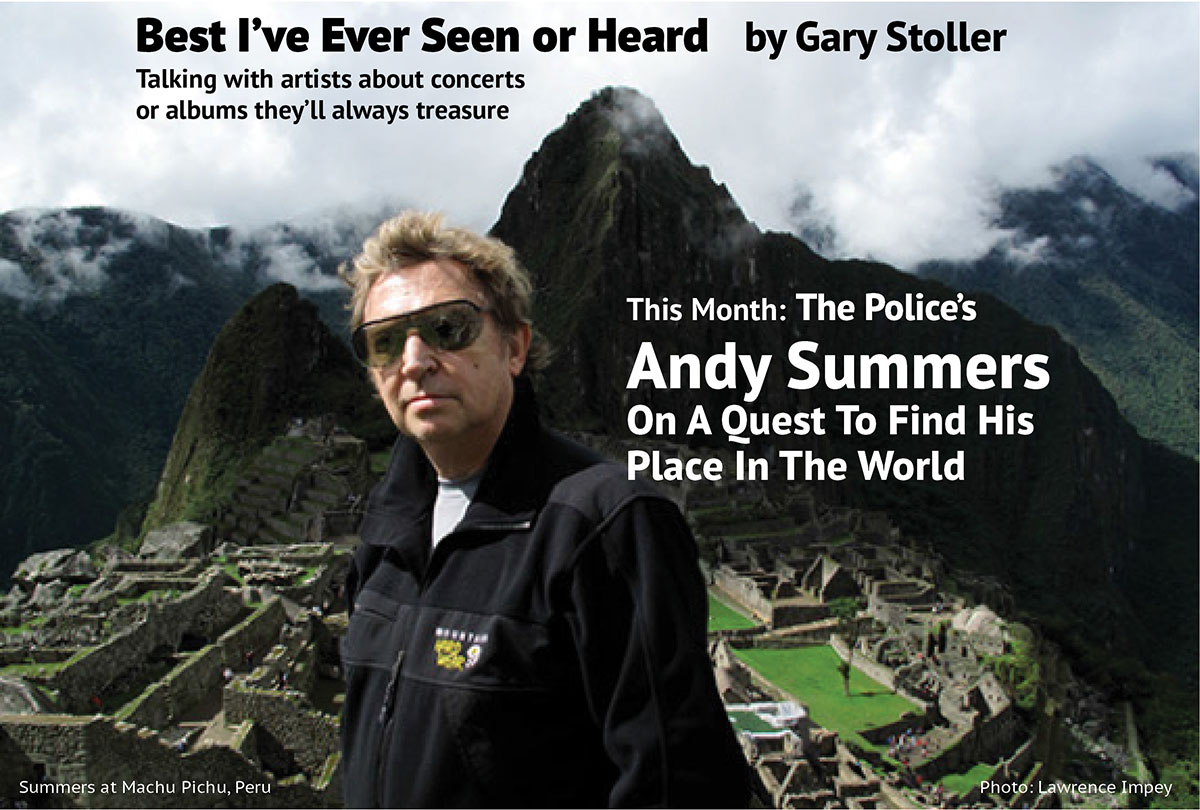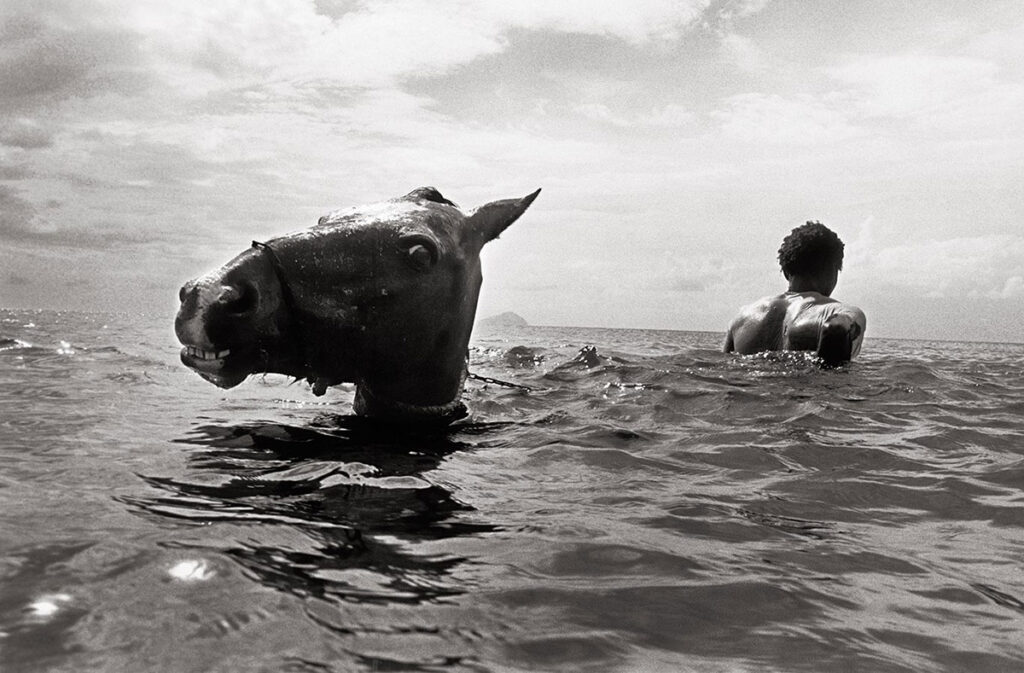
Andy Summers says his music “can’t be limited to defined categories” and “is a unique and personal spin on influences from jazz, classical, world music, rock and roll and pop.” So, maybe it shouldn’t come as a surprise that the best concert the former guitarist for the Police ever attended was earlier this year when he watched a quintet whose mentor revolutionized tango music.
“I think the greatest one I ever saw was in Los Angeles at Royce Hall at UCLA, and it was with the Astor Piazzolla Quintet,” Summers tells me while traveling on his current North America tour featuring his photography, literature and music. “Astor Piazzolla was passionate, harmonically adventurous and a great and gifted player. The harmonic sophistication and the rapport between the musicians were really something special for me.”
Piazzolla, an Argentinian, organized his first quintet in 1960, and it was a hybrid of a jazz band, a chamber music group and a small tango orchestra. He died in 1992, and six years later, a quintet was formed in his honor that recorded five albums and won a Latin Grammy for Best Tango Album of 2019.
Summers is no stranger to achievements and awards. As a member of the Police, he won five Grammy awards and sold more than 75 million albums. He currently is promoting A Series of Glances, a coffee-table book that’s one of several photography books he published. He has also written nonfiction and fiction books and released numerous solo and collaborative albums.
“I do the best I can in all mediums, but, in a way, I see them all as one medium,” he explains to me. “To put it in a corny way, it’s self-expression. Many artists reach to other mediums to express themselves, and they’re not always great in it, but you can work at it. It gives me great satisfaction to do a single page of good writing — when you’ve actually said something interesting, the sentences all make sense and the grammar is good.

Photo: Lawrence Impey
“That articulation is the same as in photography and music,” Summers continues. “The more you do it, the more sophisticated your eyes and ears get, and you start to obtain a fresh eye. With years of practice, you move out of the copying phase and start finding your own voice. This is true in all mediums. There’s nothing wrong with starting off by copying the masters and then gradually moving out from that. It’s the never-ending quest in music, photography or writing. You might also say it’s a way of finding yourself, finding your own place in the world.”
Some influential musicians’ concerts helped him find his place in the musical world.
“When I was a kid – a teenager – I was completely devoted to music,” he says. “I saw many concerts, including the Beatles, but the one that really sort of transported and inspired me was Thelonious Monk. He played at the Fairfield Hall in Croydon, London, when touring with Jazz at the Philharmonic (a concert series). He came out and played solo piano, and, man, I think I really got it. It made a dent in my brain and has always stayed with me.”
I ask Summers what is the greatest musical work he ever listened to.
“It’s a hard question to answer without sounding pompous and highbrow,” he responds, “but you have to include classical music and talk about Bach and his Cello Suites, Beethoven, Ravel, Debussy, Bartok — endless geniuses,” he says. “And, of course, there’s jazz, the Beatles and Nevermind by Nirvana. Then there’s Indian music and Kind of Blue by Miles Davis.
“Kind of Blue is one of the great breakthrough albums — very ultra cool music but somehow commercial and very engaging for people who didn’t even like jazz,” Summers says. “This could be a very long list. Of course, I would also name the Incredible Jazz Guitar of Wes Montgomery, Green Street by Grant Green, Midnight Blue by Kenny Burrell, the Thelonius Monk Orchestra at Town Hall, all the Beach Boys music and jazz guitarists Lenny Breau and Jimmy Raney. Raney was maybe my favorite jazz guitarist — exquisite phrasing.”
Summers has many favorites, and his old band, the Police, which also featured Sting on vocals and bass and drummer Stewart Copeland, was the favorite of many rock and roll fans. I ask Summers what made the music of that trio special.

Summers’ photographic prowess.
Photo: Andy Summers
“Well, the obvious answer to that is my guitar playing, of course!” he exclaims. “What would you expect me to say? But I have acknowledged we had a unique chemistry that could not have come about with anyone different in the band. It just couldn’t have. If you’d written it out on paper, it would not have made a lot of sense, so it was a sort of curious chemistry that led to the dynamic that we had.”
The solo albums of Summers delve into various musical genres. He has released 15 solo albums and many collaborations with artists from various countries.
“I am pleased with all the work I’ve done, because, once I was outside of the Police, I was more free to really find my own voice,” Summers says. “To some extent, I have a pretty distinctive musical voice, and I am probably a musical snob. I have my way of playing rhythmic-feel phrasing. We’re getting into deep musician territory here. It’s always about moving forward, trying to do something fresh and not cliched. I haven’t tired of that yet.”
Summers says he feels “very overdue” to make a new album and will probably make one early next year.
“I’ve never gotten tired of being a guitarist, a musician, a composer,” he says. “I feel very blessed that I’ve been able to spend my life doing these things.”
Has he ever looked back at his solo catalog and pointed to one that was the pinnacle of his musical artistry?
“I don’t say that,” Summers responds. “I think what keeps one moving forward is that there may be yet another peak in the distance you want to climb. So, you just keep going on, and you have an interesting time doing it.
“I love playing with other people and seeing the chemistry that might appear,” he says. “I like being in charge of my own albums, working with an engineer, going through the sometimes painful process of avoiding cliches and trying to find original and, hopefully, unique ways of composing harmonically, melodically and rhythmically. By the way, it’s all fun.”
